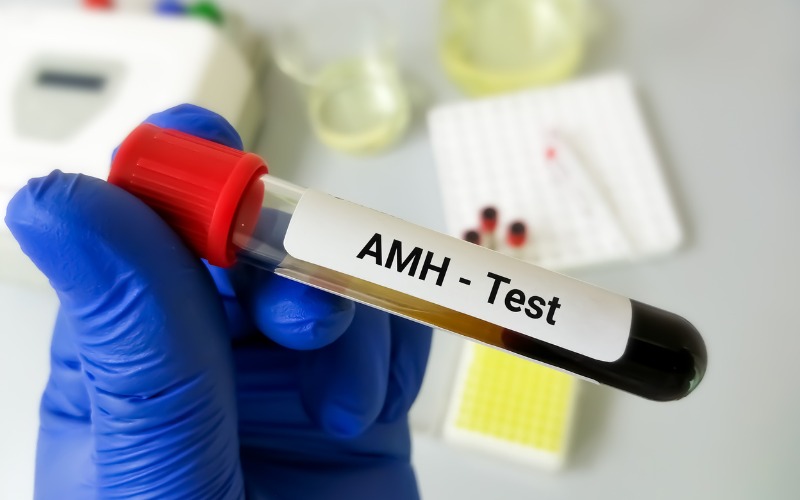Low Anti-Müllerian Hormone (AMH) levels can be a significant concern for those trying to conceive, as this hormone is an important indicator of ovarian reserve. Women with low AMH may face challenges in fertility, but there are strategies they can adopt to improve their chances of conception. This summary outlines effective approaches, from lifestyle changes to medical interventions.
Understanding AMH and Fertility
AMH is produced by the ovarian follicles and plays a critical role in regulating the development of these follicles. Low levels of AMH often indicate a reduced number of viable eggs, which can lead to difficulties in natural conception or response to fertility treatments. However, having low AMH does not mean pregnancy is impossible. Many women with low AMH can conceive naturally or through assisted reproductive technologies.
Lifestyle Modifications
Nutrition
A well-balanced diet rich in vitamins and minerals is crucial for overall reproductive health. Focus on consuming:
Antioxidant-rich foods: Fruits and vegetables like berries, leafy greens, and nuts can help combat oxidative stress, which may affect egg quality.
Healthy fats: Omega-3 fatty acids found in fish, flaxseeds, and walnuts support hormonal balance and overall reproductive health.
Whole grains: Foods high in fiber, such as whole grains and legumes, can help maintain a healthy weight and improve insulin sensitivity, which is beneficial for fertility.
Regular Exercise
Engaging in regular physical activity can help maintain a healthy weight, improve insulin sensitivity, and enhance overall hormonal balance. Aim for a mix of cardiovascular, strength training, and flexibility exercises. However, avoid excessive high-intensity workouts, which may negatively impact fertility.
Weight Management
Maintaining a healthy body weight is essential, as both underweight and overweight conditions can affect hormone levels and ovulation. Consult with a healthcare provider or a nutritionist to determine an appropriate weight range and develop a plan to achieve it.
Stress Management
High levels of stress can negatively impact fertility by disrupting hormonal balance. Implementing stress-reducing techniques can improve emotional well-being and enhance fertility. Consider practices such as:
Mindfulness and Meditation: These techniques can help reduce anxiety and improve focus on fertility goals.
Yoga: This practice can enhance relaxation and promote hormonal balance.
Support Groups: Connecting with others facing similar challenges can provide emotional support and reduce feelings of isolation.
Fertility Supplements
Certain supplements may help improve ovarian function and egg quality:
Coenzyme Q10 (CoQ10): This antioxidant may improve egg quality and support cellular energy production.
Myoinositol and D-chiro inositol: These supplements can help improve insulin sensitivity and ovarian function, particularly for women with Polycystic Ovary Syndrome (PCOS).
Folic Acid: Essential for overall reproductive health, it’s crucial to start taking folic acid when trying to conceive to support fetal development.
Medical Interventions
Fertility Testing and Consultation
Consult with a fertility specialist to conduct thorough testing and understand the specific factors affecting fertility. This may include hormone testing, ultrasound evaluations, and lifestyle assessments.
Assisted Reproductive Technologies (ART)
If natural conception proves challenging, ART options such as In Vitro Fertilization (IVF) may be recommended. IVF can be particularly beneficial for women with low AMH levels, as it allows for the selection of high-quality embryos.
Egg Donation
For women with significantly diminished ovarian reserve, egg donation may be an option. This involves using eggs from a donor to achieve pregnancy, which can be a viable route for those with low AMH.
Alternative Therapies
Consider exploring complementary therapies such as acupuncture and herbal medicine. Some studies suggest that these approaches may enhance fertility by improving blood flow to the reproductive organs and regulating hormonal balance.
Conclusion
While low AMH levels can pose fertility challenges, adopting a comprehensive approach that includes lifestyle modifications, stress management, nutritional support, and medical interventions can significantly improve the chances of conception. Each woman’s journey is unique, so it’s essential to work closely with healthcare professionals to develop a personalized fertility plan that addresses individual needs and circumstances. With the right strategies and support, achieving a successful pregnancy is possible, even with low AMH levels.
